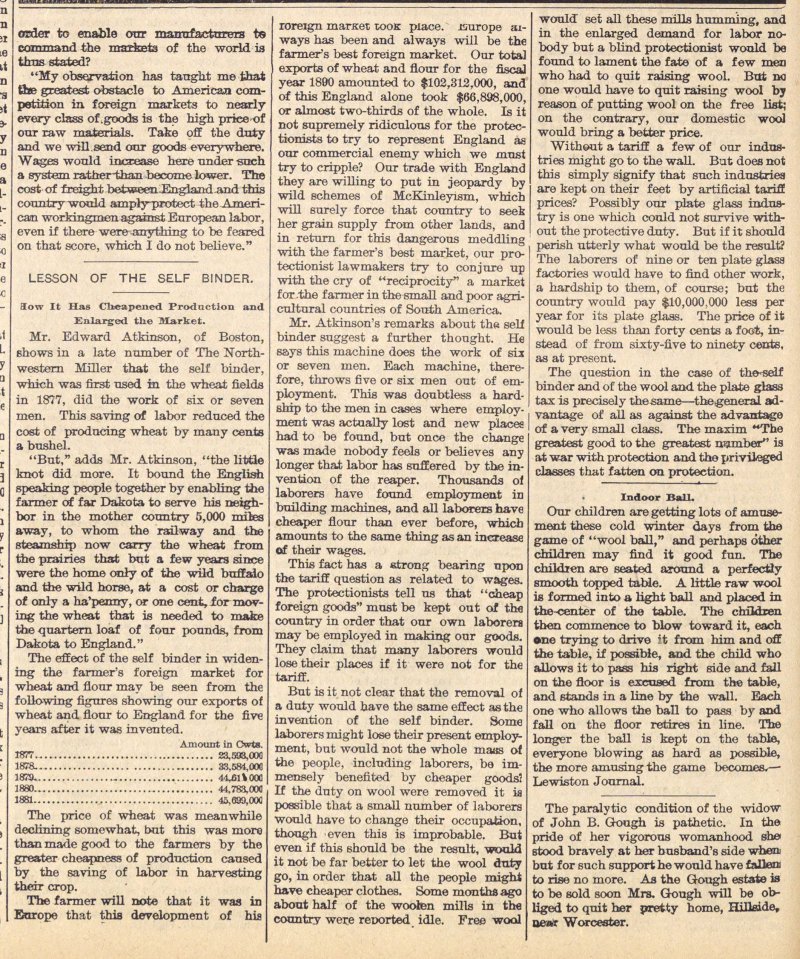Lesson Of The Self Binder

Mr. Edward Atkinson, of Boston, Bhows in a late number of The Northwestern Mfller that the self binder, which was first nsed in the wheat fields in 1877, did the work of six or seven men. This saving of labor reduced the cost of prodncing wheat by many cents a bushel. "But," adds Mr. Atkinson, "the lifcüe knot did more. It bound the English speaking people together by enabling the farmer of f ar Dakota to serve his neighbor in the mother country 5,000 miles away, to whom the railway and the steamshrp now carry the wheat from the prairies that bat a few years since were the home onry of the wild bnffalo and the wild horse, at a cost or charge of only a ha'pemry, or one cent, for raoving the wheat that is needed to niake the juartern loaf of f our pounds, from Dakota to England." The effect of the self binder in widening the farmer's foreign market for wheat and flour may be seen from the f ollowing fignres showing our exports of wheat and flour to England for the fiv years after it was invented. Amount in CwtB. 1877 23,593,000 1878 33,684,000 18Z9 4411000 1880 44,783,000 1881 45,699,000 The price of wheat was meanwhile declinmg somewhat, bat this was more than made good to the farmers by the greater cheapness of production caused by the saving of labor in harvesting their erop. The farmer will note that it was in Enrope that thia derelopment of his roreign marKet tooK place, .rsurope aiways has been and aïways will be the farmers best foreign market. Oor tota] exporte of wheat and flour f or the fiscal year 1890 amounted to $102,312,000, and of this England alone took $66,898,000, or almost two-thirds of the whole. Is it not supremely ridiculous f or the protectionists to try to represent England as onr commercial enemy which we must try to cripple? Oor trade with England they are willing to put in jeopardy by wild schemes of McKinleyism, which will surely force that country to seek her grain supply from other lands, and in return for tMs dangerous meddling with the farmer's best market, our protectionist lawmakers try to conjure up with the cry of "reciprocity" a market for .the farmer in the small and poor agricultural countries of South America. Mr. Atkinson's remarks about th seli binder suggest a further thought. He says this machine does the work of six or seven men. Each machine, therefore, throws five or six men out of employment. TMs was doubtless a hardship to the men in cases where employment was actaally lost and new places had to be found, bat once the change was made nobody feels or believes any longer that labor has suff ered by the invention of the reaper. Thousands ol laborera have found employment in building machines, and all Laborera have cheaper flour than ever before, which amounts to the same thing as an increase of thedr wages. This fact has a strong bearing upon the tariff question as related to wages. The protectionists teil us that "cheap foreign goods" must be kept out of the country in order that our own laborera may be employed in matrin our goods. They claim that many laborers would losetheir places if it were not for the tariff. But is it not clear that the removal of a dnty would have the same effect as the invention of the self binder. Some laborers might lose their present employment, but would not the whole maas of the people, including laborers, be immensely benefited by cheaper goods! If the dnty on wool were removed it ia possible that a small number of laborers would have to change their occupaüon, though even this is improbable. But even if this ehould be the result, woold it not be far better to let the wool duty go, in order that all the people mighlt have cheaper clothes. Some monthsago about half of the wooten milis in th country were reported idle. Free wool would" set all these nrills humming, and in the enlarged (Iemand for labor nobody but a blind protectionist wonld ba found to lament the fate of a few men who had to quit raising wool. Hat no one would have to quit raising wool bj reason of putting wool on the free list; on the contrary, our domestic wool would bring a better price. Without a tariff a few of our industries might go to the walL Bat does not this simply signify that such industries are kept on their feet by artificial tariff prices? Possibly our plate glass indnstry is one which could not survive without the protective dnty. But i f it shonld perish utterly what would be the result? The laborers of nine or ten plate glasa factoriea would have to find other work, a hardship to them, of course; but the country would pay $10,000,000 less per year for its plate glass. The price of it would be less than forty cents a foet, instead of from sixty-five to ninety cents, as at present. The question in the case of the-self binder and of the wool and the plate glass tax is precisely thesame - thegeneral advantage of aÜ as against the advantago of a very small class. The maxim "The greatest good to the greatest mtmber" is at war with protection and the priviled classes that fatten on protection.
Article
Subjects
Wheat
Inventions & Product Development
Farmers
Tariffs
Old News
Ann Arbor Argus
Edward Atkinson